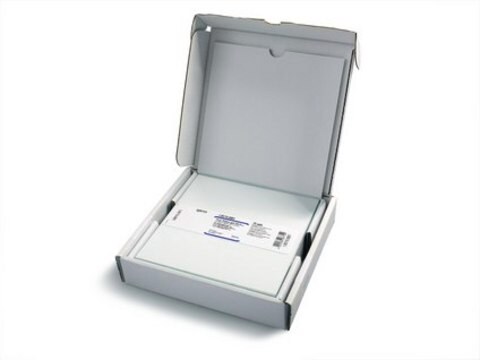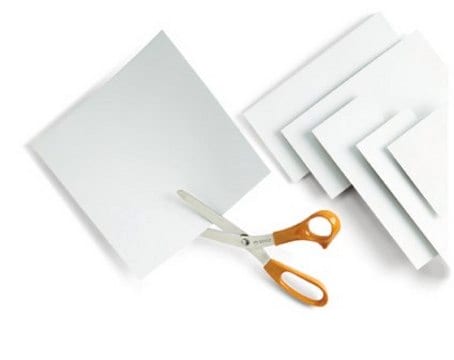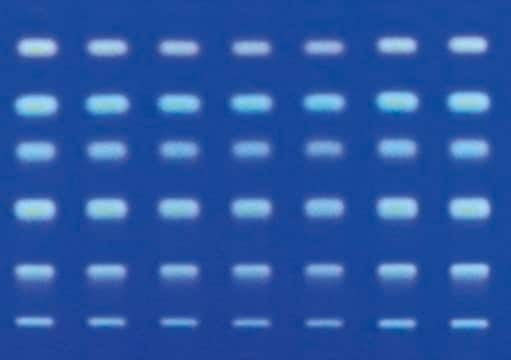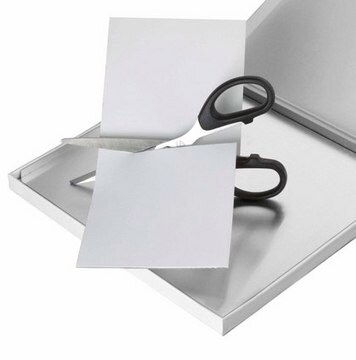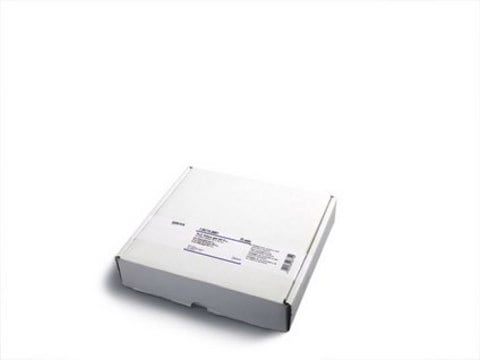1.15326
TLC plates, Silica gel 60
pkg of 100 plates, plate L × W 2.5 cm × 7.5 cm, glass support
Synonim(y):
Silica Gel 60 TLC Plates
Zaloguj sięWyświetlanie cen organizacyjnych i kontraktowych
About This Item
Kod UNSPSC:
41115711
NACRES:
NB.21
Polecane produkty
Materiały
glass support
silica gel 60 matrix
Poziom jakości
Właściwości
binder Organic Polymer
fluorescent indicator: no
opakowanie
pkg of 100 plates
metody
thin layer chromatography (TLC): suitable
grubość warstwy
250 μm
płytka dł. × szer.
2.5 cm × 7.5 cm
wielkość cząstki
10-12 μm
wielkość porów
60 Å medium pore diameter
temp. przechowywania
2-30°C
Opis ogólny
100 Glass plates 2.5 x 7.5 cm
Our classical silica TLC plates are based on a combination of our proven silica gel 60 and the addition of a unique polymeric binder resulting in a very adherent and hard surface that will not crack or blister and even allow writing with a pensil on the surface without risk to damage the layer.
Zastosowanie
- Protein-Polymer Conjugates Synthesized Using Water-Soluble Azlactone-Functionalized Polymers: Highlighting the versatility of triethylene glycol monomethyl ether in polymer synthesis, this research develops conjugates for receptor-specific cellular uptake, crucial for targeted drug delivery systems (Kim et al., 2019).
- Hydrogen-bonded six-component assembly for capsule formation: Utilizing triethylene glycol monomethyl ether, this study creates complex capsule structures with applications in material science, particularly for photoresponsive systems (Togari et al., 2018).
- An ultra-small thermosensitive nanocomposite with a Mo(154)-core: This research incorporates triethylene glycol monomethyl ether in the development of a comprehensive platform for NIR-triggered photothermal-chemotherapy, marking a significant advancement in cancer treatment technologies (Zhang et al., 2018).
- Synthesis of Polyester Dendritic Scaffolds for Biomedical Applications: Featuring triethylene glycol monomethyl ether, this article explores its use in the synthesis of polyester dendritic scaffolds, enhancing biomedical applications such as tissue engineering and regenerative medicine (Sadowski et al., 2016).
Powiązanie
Replaces: 15326-1; 15326
Komentarz do analizy
Specific surface area (according to BET; 5-Pt. measurement): 480 - 540 m²/g
Pore volume (N₂-isotherm): 0.74 - 0.84 ml/g
d 50 (laser diffraction, size distribution): 9.7 - 11.7 µm
Layer thickness: 210 - 270 µm
Deviation of layer thickness per plate: ≤ 35 µm
Chromatographic testing:
colour test
hRf-values
- bleu vif organol, colour test, lipophile:
11 - 25
- Ceres Black G, colour test, lipophile: 34 - 48
- ceres Violet brn, colour test, lipophile: 52 - 67
separation number (colourtest, lipophile): ≥ 9.0
Typical value determined on a conditioned plate
Eluent: toluene (45% rel. humidity)
Pore volume (N₂-isotherm): 0.74 - 0.84 ml/g
d 50 (laser diffraction, size distribution): 9.7 - 11.7 µm
Layer thickness: 210 - 270 µm
Deviation of layer thickness per plate: ≤ 35 µm
Chromatographic testing:
colour test
hRf-values
- bleu vif organol, colour test, lipophile:
11 - 25
- Ceres Black G, colour test, lipophile: 34 - 48
- ceres Violet brn, colour test, lipophile: 52 - 67
separation number (colourtest, lipophile): ≥ 9.0
Typical value determined on a conditioned plate
Eluent: toluene (45% rel. humidity)
Ta strona może zawierać tekst przetłumaczony maszynowo.
Certyfikaty analizy (CoA)
Poszukaj Certyfikaty analizy (CoA), wpisując numer partii/serii produktów. Numery serii i partii można znaleźć na etykiecie produktu po słowach „seria” lub „partia”.
Masz już ten produkt?
Dokumenty związane z niedawno zakupionymi produktami zostały zamieszczone w Bibliotece dokumentów.
Klienci oglądali również te produkty
Nasz zespół naukowców ma doświadczenie we wszystkich obszarach badań, w tym w naukach przyrodniczych, materiałoznawstwie, syntezie chemicznej, chromatografii, analityce i wielu innych dziedzinach.
Skontaktuj się z zespołem ds. pomocy technicznej